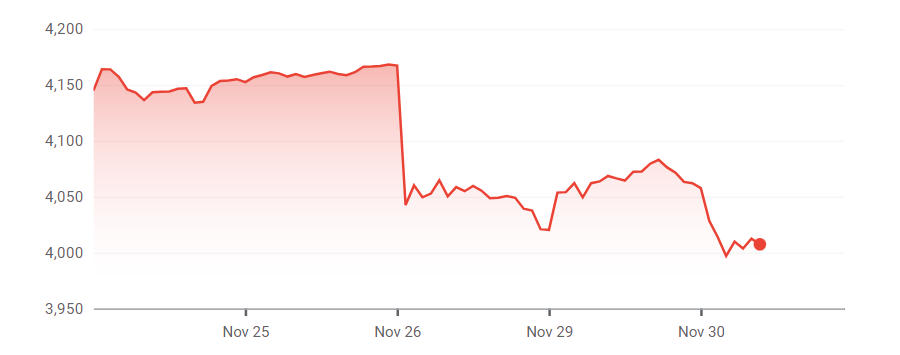Investment strategists are expecting market volatility to remain high for the foreseeable future, until the full impact of the latest coronavirus variant of concern becomes clear. 
Stocks across the globe sold off at the end of last week when several countries imposed renewed restrictions to stem the spread of the B.1.1.529 variant of concern, which has been named ‘Omicron’.
In the UK, this took the form of travel restrictions for travellers coming from South Africa and its neighbours (which is where the variant was first discovered), the need for people entering the UK to take a PCR test and self-isolate until they receive a negative result, compulsory face masks in shops and on public transport in England, and 10-days of self-isolation for all contacts of suspected Omicron cases. Changes to speed up the vaccine and booster programme have also been recommended.
As can be seen in the chart below, the FTSE All Share dropped on Friday, recovered somewhat on Monday and is down again in Tuesday’s session. A similar pattern is playing out across Europe, Asia and the US.
Performance of FTSE All Share over 5 days

Source: Google Finance
Omicron is the most heavily mutated coronavirus variant discovered so far, with 50 mutations overall and 30 on the spike protein alone, which is the target of most vaccines. This has led to worry that the variant is more transmissible and could be better at dodging vaccines.
César Pérez Ruiz, chief investment officer at Pictet Wealth Management, said: “The latest Covid variant to wreak havoc, Omicron, is particularly menacing given that the virus’s structure could evade existing vaccines. While the situation is concerning, from an economic perspective, we know what fiscal and monetary measures could be taken if necessary.”
However, he added that in order to understand the full severity of the situation, three key questions need to be answered:
1) Is Omicron more contagious than Delta?
2) Is it more dangerous?
3) How efficient are existing vaccines against it?
“Until we have enough data to answer these questions, we can expect markets to remain volatile,” Pérez Ruiz said.
On these three questions, the World Health Organization is currently coordinating with a large number of researchers around the world and says more information will emerge “in the coming days and weeks”.
Fawad Razaqzada, market analyst at ThinkMarkets, said it is clear that the market’s direction has taken a more risk-off path following the emergence of Omicron. He expected any rallies to be tested within the short term and warned that the market could drift downwards “until something fundamentally changes”.
“Judging by the market’s wild swings, it is clears that more in-depth assessment of the new Covid variant needs to be carried out, before determining whether the economy is facing a major challenge in the coming months,” Razaqzada said.
“Yesterday, investors assumed that Omicron may not be as bad as had been feared on Friday and that vaccines may still prove effective. But that thesis has been tested and investors fear they may have got it all wrong, for otherwise the markets wouldn’t have fallen this much. It will take some time to understand this variant better, given how little is known about it.
“So, get used to this sort of volatility as investors continually take profit and buy the dips here and there until there’s more clarity on the virus front, while also keeping a close eye on other macro developments. Expect choppy price action to continue over the next few weeks.”
James Penny, UK chief investment officer at TAM Asset Management, agreed that markets need more information about the new Covid variant before they can properly price-in its impact.
He said that investors will be more likely to add to their equity positions than “run for the hills”, given the need to protect against inflation and the potential for central banks to tighten monetary policy in a bid to control it. That said, he conceded that investors may become more defensive if Omicron is confirmed as being worse than Delta or if the economic recovery struggles.
“While the Omicron variant is something to be concerned with, it doesn’t strike us as anything marginally different from the Delta sell-off we saw in the summer months which, despite being volatile at the time, was simply a buying opportunity in the market,” Penny finished.
“Despite this uncertainty there remains a strong TINA trade in play – ‘there is no alternative’ (to buying equities). We don’t believe the arrival of a Covid-19 strain, which may or may not be more virulent, will be enough to derail this TINA theme into Christmas. This is with the strong caveat that these pockets of extreme volatility will remain common place as the market recovers its highs.”






